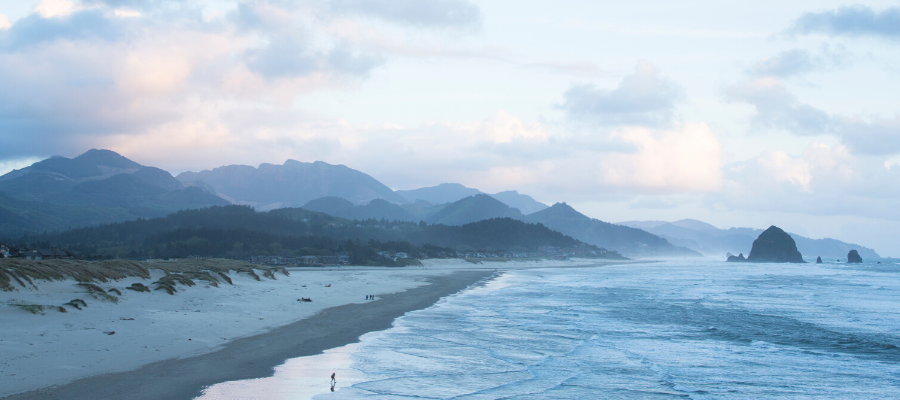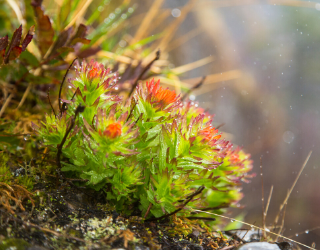
An area of the northern Oregon Coast characterized by scientists as the “Galapagos Islands of Oregon” moved a big step closer to permanent conservation Thursday with announcement of a $2,128,079 grant from the Oregon Watershed Enhancement Board awarded to North Coast Land Conservancy. With this grant, the nonprofit land trust has raised a total of $8.1 million and is now launching a campaign to raise the final $1.9 million needed to complete this landmark project with help from the community.
“Many people have worked for so many years to conserve this spectacular coastal gem,” said Katie Voelke, NCLC executive director. “Thank you to everyone who has come together to get the project this far. Now let’s get it to the finish!
“Times of crisis and upheaval such as what we are experiencing nationwide remind us of our need for nature and its healing power. Wide open spaces are food for our souls.”
The Conservancy is in the third year of a five-year effort to acquire what it calls the Rainforest Reserve: 3,500 acres of forested coastline south of Arch Cape, adjacent to Oswald West State Park and above Cape Falcon Marine Reserve. When completed, the Rainforest Reserve will create an uninterrupted 32-square-mile conservation corridor stretching from the summits of 3,000-foot peaks—the horizon you see looking south from Cannon Beach or north from Rockaway Beach—to Short Sand Beach and the sandy seabed and rocky reefs of the nearshore ocean.
 The Galapagos comparison stems from the area’s geological history and biological diversity. What are now basalt peaks were once—millions of years ago—isolated as nearshore islands. As a result, an unusual mix of plants and animals evolved on those high peaks, some of them found nowhere else on Earth. The property also includes the headwaters of streams providing drinking water to Cannon Beach and Arch Cape; conservation of the Rainforest Reserve will help ensure clean drinking water for residents and visitors and will help lower water treatment costs.
The Galapagos comparison stems from the area’s geological history and biological diversity. What are now basalt peaks were once—millions of years ago—isolated as nearshore islands. As a result, an unusual mix of plants and animals evolved on those high peaks, some of them found nowhere else on Earth. The property also includes the headwaters of streams providing drinking water to Cannon Beach and Arch Cape; conservation of the Rainforest Reserve will help ensure clean drinking water for residents and visitors and will help lower water treatment costs.
“I’m grateful to the board and staff of OWEB for demonstrating their confidence in NCLC by awarding a grant of this size and for having the foresight to invest in the Rainforest Reserve,” said John Mersereau, NCLC board president. “This grant gets us ever closer to purchasing and stewarding what will again be a mature, healthy rainforest. I’m proud we can be a part of that.”
Protection of the proposed Rainforest Reserve has been a goal of coastal conservationists for decades. Seventy years ago Oregon’s first state parks superintendent, Sam Boardman, characterized the property as “one of the greatest opportunities for creating one of the outstanding natural parks in the nation.”
In 2016 North Coast Land Conservancy entered talks with Ecotrust Forest Management, a forestland investment management company committed to sustainable forestry. That led Onion Peak Holdings, a subsidiary of EFM, to purchase 5,000 acres of forestland from Stimson Lumber Company. NCLC immediately signed a purchase and sales agreement with the owner, giving the conservancy five years to raise the money needed to buy the property. Arch Cape Water District is meanwhile working to acquire an additional 1,500 acres to create a community forest with support from the conservancy.
The grant awarded to NCLC by OWEB is unusually large; rarely does the agency award grants worth $1 million or more. The state agency helps Oregonians take care of local streams, rivers, wetlands and natural areas. Funding for OWEB grants comes primarily from the Oregon Lottery, Pacific Coast Salmon Recovery Fund, and state salmon license plate revenue.
“Our land acquisition grant program is very competitive and seeks to protect places with a high ecological value,” said Katie Duzik, OWEB North Coast Program Representative. “The Rainforest Reserve property was selected for an OWEB grant award as the project stands out as an exceptional opportunity for investment due to the landscape scale of the conservation effort. The opportunity to acquire a large intact forest on the immediate coast for conservation is uncommon.”
“We all share this earth, and we all bear responsibility for her stewardship,” Voelke added. “Opportunities to make a significant difference come along maybe once or twice in our lifetime. This is one of those opportunities.”
North Coast Land Conservancy, headquartered in Seaside, is one of Oregon’s leading land trusts. Currently it protects 52 habitat reserves and conservation easements totaling nearly 5,000 acres between the Columbia River and Siletz Bay.
Comments